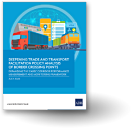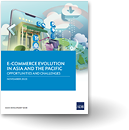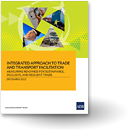Spotlight Archives
- ADB Working Paper Series on Regional Economic Integration No. 81 - Economic Crises and Institutions for Regional Economic CooperationJune 2011C. Randall Henning compares six regional economic crises over the last four decades and the institution building—or decay—that followed. The analysis concludes that five conditions are especially important in generating a constructive regional response: (i) a significant degree of regional economic interdependence; (ii) an independent secretariat or intergovernmental body charged with cooperation; (iii) webs of interlocking economic agreements; and, as elements of the multilateral context, (iv) conflict with the relevant international organization (such as the International Monetary Fund [IMF]); and (v) the support of the United States. Read more.
- ADB Working Paper Series on Regional Economic Integration No. 80 - Sequencing Regionalism: Theory, European Practice, and Lessons for AsiaJune 2011Richard Baldwin employs feedback mechanisms to organize Europe’s postwar integration narrative and then draws lessons for today’s integration of East Asia. The paper suggests that the spontaneous cooperation that created “Factory Asia” has not been codified. One starting point for Asian regional institutions would be to institutionalize the spontaneous cooperation that already exists on trade, services, and investment. New, creative thinking is needed on the sort of soft-law commitments and new modes of cooperation that would make this work with limited sovereignty pooling. Read more.
- ADB Working Paper Series on Regional Economic Integration No. 78 - Trade and Investment in the Greater Mekong Subregion: Remaining Challenges and the Unfinished Policy Agenda23 May 2011In this paper, Jayant Menon and Anna Melendez examine the challenges that remain which limit the potential of the Greater Mekong Subregion (GMS) to reap further gains from trade and investment. Over the coming years, these countries will have to implement numerous ASEAN+1 bilateral free trade agreements. To minimize the administrative burden and maximize economic benefits, these countries should multilateralize their trade preferences, thereby avoiding trade diversion and deflection, and remaining open to global trade. Read more.
- ADB Working Paper Series on Regional Economic Integration No. 79 - Financial Integration in Emerging Asia: Challenges and ProspectsMay 2011In this paper, Cyn-Young Park and Jong-Wha Lee show an increasing degree of financial integration in emerging Asian markets using both quantity- and price-based measures. However, the region’s equity markets are integrated more globally than regionally, while its local currency bond markets remain generally segmented. A case can be made for further regional integration of financial markets, as financial integration at the regional level brings benefit from allocation efficiency and risk diversification while containing the risk of financial contagion. Read more.
- A Closer Look at East Asia's Free Trade Agreements10 May 2011Masahiro Kawai and Ganeshan Wignaraja observe that East Asia’s attitude toward free trade agreements (FTAs) has changed. Slow progress in global trade talks has led to a surge in FTAs across Asia. With the World Trade Organization (WTO) Doha Round trade talks stalled, Asian countries see FTAs as a means to liberalise trade and investment and sustain economic recovery in the region. However, critics worry that this wave of agreements will undermine the multilateral liberalisation process. Read more.
- Asia 2050: Realizing the Asian Century4 May 2011An additional 3 billion Asians could enjoy higher living standards, and the region could account for over half of global output by the middle of this century, says a new ADB commissioned report. This potentially promising future for the region, sometimes referred to as the “Asian Century” though plausible, is by no means preordained. A draft overview of the report will be unveiled and discussed at the Governors' Seminar in ADB's 44th Annual Meeting, Ha Noi. Click here for details.
- Reshaping Global Economic Governance and the Role of Asia in the Group of Twenty (G20) (April 2011)26 April 2011This report, jointly prepared by ADB and the Peterson Institute for International Economics, aims to provide strategic guidance for emerging Asia’s participation in the G20 and related discussion about reform of global economic governance. It draws on important lessons from the global financial crisis to offer policy recommendations in areas of imminent challenge confronting the leaders from both old and emerging powers. Read the report.
- Asian Development Outlook 2011: South-South Economic Links6 April 2011ADB's flagship annual economic publication, Asian Development Outlook 2011, forecasts developing Asia to expand solidly over the next two years, even as inflation, geopolitical uncertainties and the need to develop new sources of growth present looming challenges to policy makers. In a special chapter titled "South-South Links", the ADB says that strengthening economic links between countries in the South can create new global growth that can take up the slack left by cooling demand from industrialized countries in the North. The report provides an analysis of economic performance for 2010 and offers forecasts for the 45 Asian economies that make up developing Asia. Read the report and news release.
- Asia Bond Monitor March 201130 March 2011Emerging East Asia's local currency bond markets expanded by 13.6% to $5.2 trillion in 2010, driven by strong growth in corporate bonds that helped to offset a decline in issuance by central banks and some governments in the last quarter of 2010. The latest edition of the Asian Development Bank's quarterly Asia Bond Monitor shows that growth has been broad-based. The region's local currency bond markets, excluding the People's Republic of China (PRC), expanded by 11.6% in 2010. Total bonds outstanding in the PRC, the region’s largest market, grew 15.1% to reach $3.1 trillion. Read the news release. Download the report.
- ADB Working Paper Series on Regional Economic Integration No. 77 - Early Warning Systems in the Republic of Korea: Experiences, Lessons, and Future StepsMarch 2011In the wake of the 1997/98 financial crisis, the Republic of Korea introduced an Early Warning System (EWS) to prevent the recurrence of a similar crisis. Hyungmin Jung and Hoe Yun Jeong examine the country's EWS and provide key lessons and policy recommendations to other national surveillance units seeking to improve their EWS. Read more.




